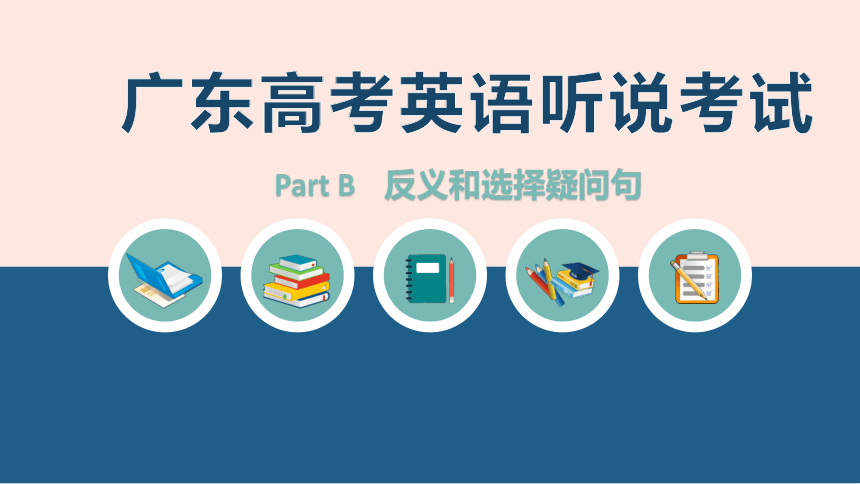2024届高考英语听说备考之反义和选择疑问句复习课件(共10张PPT)
文档属性
| 名称 | 2024届高考英语听说备考之反义和选择疑问句复习课件(共10张PPT) |  | |
| 格式 | pptx | ||
| 文件大小 | 579.6KB | ||
| 资源类型 | 教案 | ||
| 版本资源 | 通用版 | ||
| 科目 | 英语 | ||
| 更新时间 | 2023-11-21 16:22:29 | ||
图片预览





文档简介
(共10张PPT)
广东高考英语听说考试
Part B 反义和选择疑问句
反义疑问句
反意疑问句是由两部分组成的,前一部分是对事物的陈述(即陈述句 ),后一部分是简短的提问(即简短疑问句 ),中间用逗号隔开。
1. 反义疑问句的语序
陈述句+be动词/助动词/情态动词(肯/否)+主语(代词)
(2011广东E)英国人不太在乎穿什么衣服,对吗?
步骤:1. 先翻译前面的陈述句
2. 再确定用be动词/助动词/情态动词
3.注意:前肯后否,前否后肯
The British people care little about clothes,
do they
“三问”- 疑问句翻译特训
反义疑问句
(1) 这个房子很大,不是吗?
(2) 他今天看起来不高兴,对吗?
(3) 这台电脑出问题了,不是吗?
(4) 她以前经常独自去那里,对吗?
(5) 我们之中极少人知道这道题的答案,不是吗?
(6) Smith先生对他的邻居们并不十分了解,是吗?
This house is very large, isn't it
He looks unhappy today, don't you
There's something wrong with the computer, isn't there
She used to go there alone, didn't she
Few of us know the answer to the question, do we
Mr. Smith doesn't know his neighbors very well, does he
1. 选择疑问句的语序:
特殊疑问句或者一般疑问句+A or B
步骤:
他在那个镇上住了多久,五年还是十年?
1. 先翻译疑问句
2. 再确定 A or B (注意有些词块中的介词,冠词不能少)
How long did he live in the town,
five years or ten years
“三问”- 疑问句翻译特训
3. 选择疑问句
(1) 你和Frank谁跑得更快?
(2) 那位作家出生于1985年还是1986年?
(3) 你喜欢这条黑色的裤子还是那条蓝色的?
(4) 你周末经常待在家里还是和朋友出去?
(5) 我们怎么去博物馆呢,是走路还是坐公共汽车?
Who runs faster, you or Frank
Was the writer born in 1985 or 1986
Do you like the black trousers or the blue ones
Do you usually stay at home or go out with your friends on weekends
How shall we go to the museum, on foot or by bus
一般疑问句Summary
翻译小技巧:先翻译陈述句,再将Be提到句首。
含Be(Am/Is/Are/Was/Were)的一般疑问句语序:Be动词+主语+其他
Q:哪些汉语中暗含Be?
中文里含有“是”,或形容词(意义),或一般现在或者一般过去时的被动语态或There be句型等情况时
特殊疑问句Summary
1. 大部分特殊疑问句的语序:
疑问代词/疑问副词 +be动词/助动词/情态动词+主语+谓语+其他(疑问代词+一般疑问句)
2. 小部分特殊疑问句的语序:
注意:当疑问代词作主语、表语或主语的定语时,后面不需加be动词/助动词/情态动词和主语,直接加谓语和其他成分, 用陈述句语序,其结构为:疑问代词 +谓语/系动词+其他
疑问形容词+名词+谓语/系动词+其他
常用特殊疑问词
1.疑问代词:what,who(什么,谁。作主语)
which(哪个。在一定范围内选择)
whose(谁的。指附属关系)
whom(谁。作宾语)
2.疑问副词:when(何时。询问时间)
where(何地。询问地点)
why(为什么。询问原因)
how(如何。询问手段、方式、工具以及程度)how long/soon/many/much/ far等
3.疑问形容词:what(which,whose)+名词
谢谢您的聆听
敬请各位老师提出宝贵意见
THANK YOU FOR YOUR LISTENING
广东高考英语听说考试
Part B 反义和选择疑问句
反义疑问句
反意疑问句是由两部分组成的,前一部分是对事物的陈述(即陈述句 ),后一部分是简短的提问(即简短疑问句 ),中间用逗号隔开。
1. 反义疑问句的语序
陈述句+be动词/助动词/情态动词(肯/否)+主语(代词)
(2011广东E)英国人不太在乎穿什么衣服,对吗?
步骤:1. 先翻译前面的陈述句
2. 再确定用be动词/助动词/情态动词
3.注意:前肯后否,前否后肯
The British people care little about clothes,
do they
“三问”- 疑问句翻译特训
反义疑问句
(1) 这个房子很大,不是吗?
(2) 他今天看起来不高兴,对吗?
(3) 这台电脑出问题了,不是吗?
(4) 她以前经常独自去那里,对吗?
(5) 我们之中极少人知道这道题的答案,不是吗?
(6) Smith先生对他的邻居们并不十分了解,是吗?
This house is very large, isn't it
He looks unhappy today, don't you
There's something wrong with the computer, isn't there
She used to go there alone, didn't she
Few of us know the answer to the question, do we
Mr. Smith doesn't know his neighbors very well, does he
1. 选择疑问句的语序:
特殊疑问句或者一般疑问句+A or B
步骤:
他在那个镇上住了多久,五年还是十年?
1. 先翻译疑问句
2. 再确定 A or B (注意有些词块中的介词,冠词不能少)
How long did he live in the town,
five years or ten years
“三问”- 疑问句翻译特训
3. 选择疑问句
(1) 你和Frank谁跑得更快?
(2) 那位作家出生于1985年还是1986年?
(3) 你喜欢这条黑色的裤子还是那条蓝色的?
(4) 你周末经常待在家里还是和朋友出去?
(5) 我们怎么去博物馆呢,是走路还是坐公共汽车?
Who runs faster, you or Frank
Was the writer born in 1985 or 1986
Do you like the black trousers or the blue ones
Do you usually stay at home or go out with your friends on weekends
How shall we go to the museum, on foot or by bus
一般疑问句Summary
翻译小技巧:先翻译陈述句,再将Be提到句首。
含Be(Am/Is/Are/Was/Were)的一般疑问句语序:Be动词+主语+其他
Q:哪些汉语中暗含Be?
中文里含有“是”,或形容词(意义),或一般现在或者一般过去时的被动语态或There be句型等情况时
特殊疑问句Summary
1. 大部分特殊疑问句的语序:
疑问代词/疑问副词 +be动词/助动词/情态动词+主语+谓语+其他(疑问代词+一般疑问句)
2. 小部分特殊疑问句的语序:
注意:当疑问代词作主语、表语或主语的定语时,后面不需加be动词/助动词/情态动词和主语,直接加谓语和其他成分, 用陈述句语序,其结构为:疑问代词 +谓语/系动词+其他
疑问形容词+名词+谓语/系动词+其他
常用特殊疑问词
1.疑问代词:what,who(什么,谁。作主语)
which(哪个。在一定范围内选择)
whose(谁的。指附属关系)
whom(谁。作宾语)
2.疑问副词:when(何时。询问时间)
where(何地。询问地点)
why(为什么。询问原因)
how(如何。询问手段、方式、工具以及程度)how long/soon/many/much/ far等
3.疑问形容词:what(which,whose)+名词
谢谢您的聆听
敬请各位老师提出宝贵意见
THANK YOU FOR YOUR LISTENING
